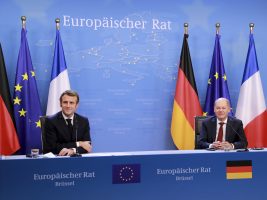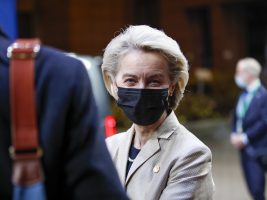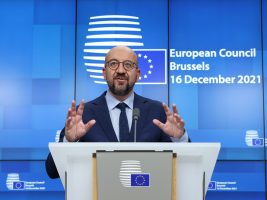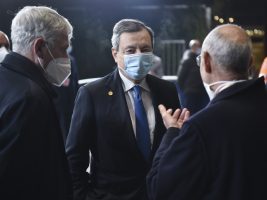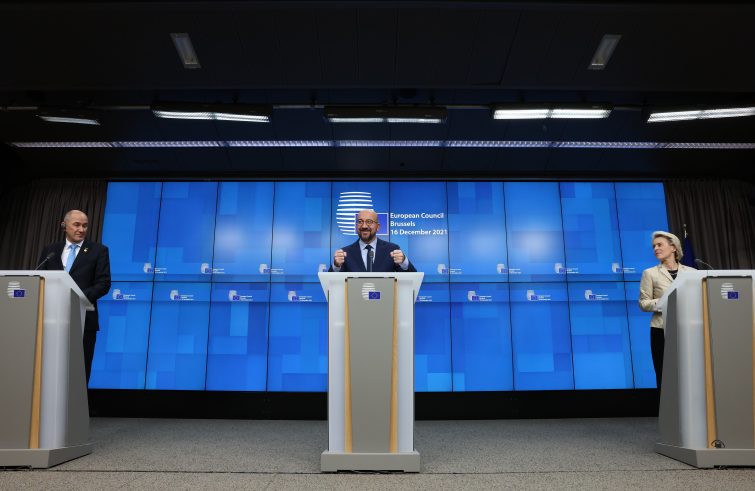
Energy, nuclear power, emission quotas. Not least the response to COVID-19 variants. Instead of uniting the EU, these extremely serious issues are causing a division – despite diplomatic smiles – in their approach. In contrast, broad agreements were reached on security and external threats, be they Russia, Belarus or even migration. The conclusions of the European Council, which took place yesterday in Brussels, make no mention of the “energy” issue ( despite the sharp rise in prices), thereby confirming that no agreement has been reached by the 27 Member States. The matter has been put off until another summit some time in the future.
Omicron and booster doses. The summit extensively addressed “the worsening epidemiological situation in the EU and the emergence of the Omicron variant”: the new variant is a cause for concern. Member State leaders unanimously underlined the vital importance of vaccination in the fight against the pandemic. “Rolling out vaccination to all and deploying booster doses – reads the seven-page final document – is crucial and urgent.” In that context, “overcoming vaccine hesitancy, including by addressing disinformation, remains key.”
Besides vaccinations, an agreement on prevention measures is unlikely: each country is proceeding on its own track, including Italy.
Not least because – in Brussels it was evident – concerns over the pandemic are shared by every state and government, but the epidemiological data differ greatly from one country to the next. Italy’s precautionary measures are now seen by many as an example to be followed.
- (Photo SIR/European Council)
- (Photo SIR/European Council)
- (Photo SIR/European Council)
Exporting vaccine doses. “Continued coordinated efforts are needed to respond to developments based on the best available scientific evidence, whilst ensuring that any restrictions are based on objective criteria and do not undermine the functioning of the Single Market or disproportionately hamper free movement between Member States or travel into the EU”, write the heads of Government and State. But there are blatant divisions over the importance attached to the Green Pass. An effective formula insofar as it is generic. From a global perspective: “The EU is committed to playing its role in achieving global vaccination. The EU is the biggest donor and exporter in the world. We will continue to export and share vaccine doses and ancillary materials,” in particular in Africa, under the COVAX strategy.
Security and the fight on hybrid threats. Security and defence are addressed in the next section, setting out the EU’s commitment “to the global rules-based international order, with the United Nations at its core, and to strengthening cooperation with partners throughout the world in order to address common threats and challenges together.”
Increased global instability, along with military and terrorist threats, are prompting some (slow and uncertain) steps towards a Common Defence under NATO’s umbrella.
The Commission is invited to make proposals on space security, cyberspace and the fight against hybrid threats.
No progress on migration. The discussion and the conclusions on migration, considered in terms of border security ,(asylum, reception, integration were not on the summit’s agenda) were disappointing. The European Council reiterates its condemnation of attempts by third countries to instrumentalise migrants for political purposes.” It underlines the need “to develop tools to “address the instrumentalisation of migration”, while at the same time highlighting the issue of external border surveillance.
- (Photo SIR/European Council)
- (Photo SIR/European Council)
- (Photo SIR/European Council)
Ultimatum to Russia. The Conclusions understandably condemn belligerent neighbouring countries. The European Council “strongly” condemns the instrumentalisation of migrants and refugees by the Belarusian regime “and the humanitarian crisis it has created”. The EU will continue “to counter the hybrid attack launched by Belarus with a determined response, addressing all dimensions of the crisis in line with EU law and international obligations, including fundamental rights.” This includes border protection, combating trafficking in persons, humanitarian aid. The EU calls for free and fair elections to restore Belarus to the international community. The EU 27 Council thus stressed “the urgent need for Russia to de-escalate tensions caused by the military build-up along its border with Ukraine and aggressive rhetoric.”
The European Council reiterates its “full support for Ukraine’s sovereignty and territorial integrity.”
Any further military aggression against Ukraine will have massive consequences and severe cost in response, including restrictive measures coordinated with partners.”
Ethiopia. The European Council “continues to follow closely the situation in Ethiopia and fully supports the mediation efforts of African Union High Representative Obasanjo.” The EU “calls for an unconditional ceasefire and urges all parties to engage in an inclusive and transparent national dialogue.” Ensuring the protection of civilians and providing unhindered humanitarian access “remain key priorities.”


